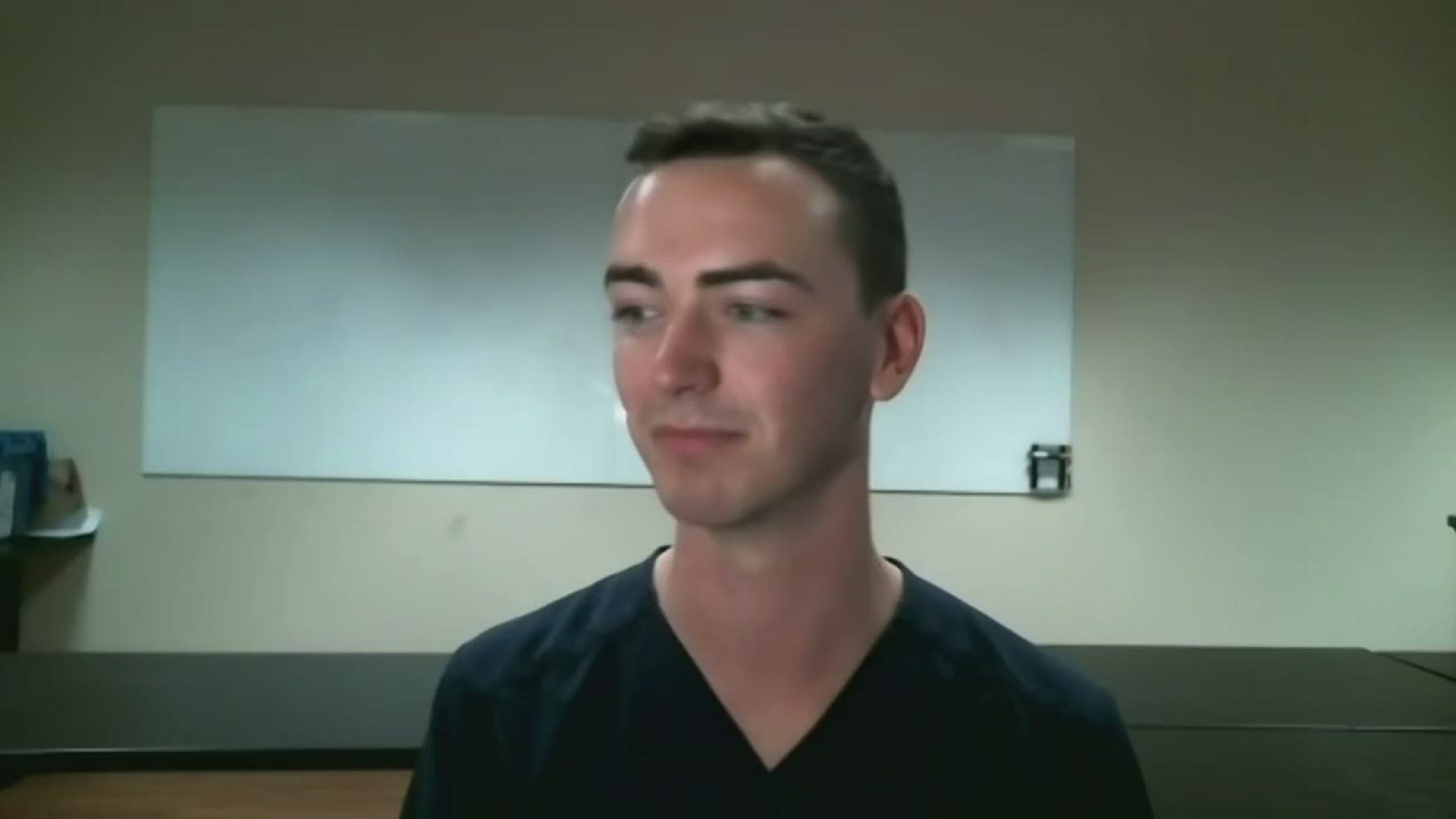BIRMINGHAM, Ala — Shelby Roberts, a registered nurse in UAB Hospital at the University of Alabama at Birmingham, recently saw a patient on her medical intensive care unit fighting to live, and struggling to do so.
The patient’s family wanted to be by their loved one’s bedside, but it just was not possible. Not in these times, when a novel coronavirus we know as COVID-19 prevents even medical caregivers from providing care in a way they are accustomed to. Unfortunately, it also demands that family members do what they could never imagine doing when a loved one is battling to live — be at home.
So Roberts, one of the nurses who has been caring for the most critically ill COVID-19 patients in UAB Hospital’s Medical Intensive Care Unit — and dressed head to toe in her personal protective equipment — grabbed her phone.
Roberts put the phone in a plastic bag, went into the patient’s room and called the patient’s immediate family. They merged in more family to the call.
And then, they sang.
Amazing grace, how sweet the sound …
“I just held the phone up near her ear so she could listen, and I held her hand,” Roberts said. “She wasn’t really coherent, and the whole thing was just so sad. These patients are so sick, and their loved ones can’t be there with them in their time of need. We are trying to provide comfort, and that’s been hard, because we are not able to be with them as much as we would like to be. But, still, we can be there, and it is rewarding to be with these patients when nobody else can be.”
While the frontline nurses acknowledge the physical and emotional challenges they have faced thus far caring for COVID-19-positive patients during this coronavirus pandemic, Roberts and two of her UAB nursing colleagues — Jake Perkins and Taylor Floyd — all say they could not see themselves doing anything else.
“This is something I feel like I was called to do,” said Floyd, a nurse on the internal medicine unit taking care of acutely ill, or less critical, COVID-19-positive patients. “Our patients battling this, they have a lot of fear of the unknown. Their family members do, too; but in speaking with them, they just have a lot of appreciation. They really appreciate all we are doing, and we appreciate the patience they have with us.”
When asked if this situation was similar to other infectious disease patients he has had to care for, the only comparison Perkins said he would begin to compare it with would be caring for tuberculosis patients, another highly infectious disease risk for health care workers. Caring for TB patients requires a high use of personal protective equipment, just as with COVID-19 patients.
But Perkins, a 2018 graduate of UAB’s School of Nursing, may care for one or at the most two TB patients at any given time. UAB Hospital has had more than 46 patients under investigation for or hospitalized with COVID-19 every day since March 24, including highs of 136 in March and 118 in April. More than half of those diagnosed with COVID-19 have typically required ICU care. Some patients who have been under investigation for COVID-19 also require ICU care before their diagnosis is known.
“It’s a challenge because the rules change every day as more is learned about this,” Perkins said. “I’m working with people who have been nurses for more than 20 years, and they’re learning. We’re all in the same boat, because there is no familiarity with it. It’s like being a new nurse. But I could not ask for a better staff to do this with. We are helping and supporting each other and learning together.”
The nurses all say the community support they have received through the Meals for Heroes program, notes of encouragement from area children, the artwork provided by UAB Arts in Medicine and other acts have been uplifting and appreciated.
“The fact that people have felt so appreciative when, truly, I’m just coming in to do my job, it has really made a difference,” Floyd said. “We have friends, family members, other units in the hospital and then the people we don’t know who have reached out and sent food and goodie bags, and we’ve seen the messages on the sidewalks. It’s all very rewarding and makes it — I’m not going to say worth it because there are a lot of things that make it worth it, but it does make you feel appreciated.”
As far as being hailed heroes for their work, Perkins appreciates the sentiments but says he is hesitant to embrace the title. After all, he is taking care of patients — and that is what he wants to do.
“This is all I could see myself doing, so as far as the health care hero label, I’m not sure,” he said. “I think it’s hard to know the difference we’re making right now. All I can think about is how hard it is for these patients to be here alone, and how my voice, my face, is the only contact they are going to get for a long time.
“A lot of the time in our critical care unit setting, patients may not always be able to understand what’s going on, and before all this happened, just the touch or the voice of a family member or a loved one is enough to settle someone that may not be coherent. So I don’t know that the term ‘hero’ makes that feeling come to mind, but that’s when I’ve felt the most heroic I think is what I’m trying to say — when I have been able to have that moment with the patient that is longing for a loved one or someone to be there with them.”
IN OTHER NEWS:

